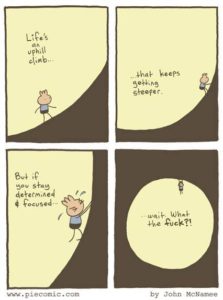 Mental health problems have a way of taking over. I’m lucky enough never to have been hospitalised or signed off work. Life has always stumbled on. But moods and behaviours creep in and twist their tendrils around daily life. They trick you into thinking they’re normal, into nourishing them. It’s not until they start to suffocate and strangle even the simplest of things that you recognise their power. And then it’s too late for an easy fix.
Mental health problems have a way of taking over. I’m lucky enough never to have been hospitalised or signed off work. Life has always stumbled on. But moods and behaviours creep in and twist their tendrils around daily life. They trick you into thinking they’re normal, into nourishing them. It’s not until they start to suffocate and strangle even the simplest of things that you recognise their power. And then it’s too late for an easy fix.
This year I’ve started the long process of hacking away at the thicket and pulling up roots that go incredibly deep. It hasn’t been easy. But now I’ve made some space it’s much easier to see what a tangle I was in.
Eating new food
I recently turned 33 and enjoyed a breakfast made for me by Alex without having to purge it through exercise.The day before my birthday last year I was panicking over choosing something nice (and therefore different) for my birthday breakfast. I cried outside the bread shop. I ended up with toast and even then it was a tricky day.
Letting go of control in the kitchen
I no longer have to have control in the kitchen. I’ll eat something made for me by someone else – even if I didn’t see whether they used butter or check how much oil they added.
Reaquainting myself with cheese
I had cheese on toast for the first time in two years last week (cheese has been a scary food for years).
Cutting down my exercise
I’ve reduced the amount of exercise I do by two thirds. I’ve stopped spinning and left the gym completely – it was too difficult to find a balance with so many reminders of old behaviours. Once or twice I’ve even managed to listen to my body and choose not to go on a planned run because I felt too tired. I’ve also stopped recording all my exercise online. My Garmin helps me make sure the miles are not creeping up again but I try to keep cycling, walking and swimming for enjoyment – not numbers.
Seeing things more clearly
I can look at photos of myself on honeymoon and in early 2016 and see that I was too thin. At the time not only felt enormous, growing bigger and bigger after my wedding, but I disliked the same pictures because I thought I looked fat. Looking at those pictures and remembering those feelings of disgust and panic makes me sad – but also helps me recognise how twisted up I was getting.
Recognising problematic behaviours
I can recognise when I start to take refuge in old behaviours. When I feel low or anxious I often eat. In that instant it makes me feel calmer. But when I’m feeling bad I can’t handle sitting with ‘too much’ food in my stomach. I have to purge and, for me, excessive exercise is the easiest way to do that. I know in the short term it will make me feel better – calmer and more in control. But I also know that it will deplete my energy levels. And if my mind has fewer resources, I find it harder to use other coping strategies. I feel lower, more anxious. I haven’t the strength to cope in other ways. I run more. And so it goes on.
Finding new ways to cope
I don’t manage to move away from those behaviours every time. The darkness of winter hasn’t helped. I’ve felt the scary edges of more difficult moods creep in as the light goes. But the changes I’ve made mean my brain usually has more energy and therefore more capacity to cope with difficult emotions in other ways. And I’ve realised that, once I’ve pulled out of that vicious cycle, my energised brain is actually calmer too.
I have space in my head for new things – learning to drive, writing, moving to the country (and dammit, I’m even going to eat me a lot of peaches!). I still have good weeks and bad weeks – but even the bad weeks are better than the best of weeks used to be.

Thanks for sharing this Clare. And well done! I have been on a similar journey to you and I can definitely vouch that the more you practice breaking negative cycles, the easier it becomes…until one day you realise it hasn’t even crossed your mind! Rosie x
Great way of looking at things